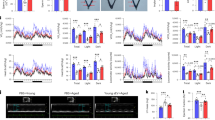Abstract
WHEN the red-cell hæm of familial hæmolytic anæmia patients is isotopically tagged, as by the administration of glycine-15N, the curves of subsequent isotope-levels are interpretable in at least two ways1. It is shown here that the one of the interpretations which is most widely accepted is also consistent with the related data on tagging of the excreted stercobilin. This result combines with other data to imply that the incorporation of hæm occurs only during a relatively late part of the development of red cells in the bone marrow of these patients.
This is a preview of subscription content, access via your institution
Access options
Subscribe to this journal
Receive 51 print issues and online access
$199.00 per year
only $3.90 per issue
Buy this article
- Purchase on Springer Link
- Instant access to full article PDF
Prices may be subject to local taxes which are calculated during checkout
Similar content being viewed by others
References
Evans, Robert L., Nature, 177, 839 (1956).
James, III, G. Watson, and Abbott, jun., Lynn D., Proc. Soc. Exp. Biol. Med., 88, 398 (1955).
Author information
Authors and Affiliations
Rights and permissions
About this article
Cite this article
EVANS, R. Red-Cell Survival in Familial Hæmolytic Anæmias. Nature 180, 1435–1436 (1957). https://doi.org/10.1038/1801435a0
Issue Date:
DOI: https://doi.org/10.1038/1801435a0
Comments
By submitting a comment you agree to abide by our Terms and Community Guidelines. If you find something abusive or that does not comply with our terms or guidelines please flag it as inappropriate.



